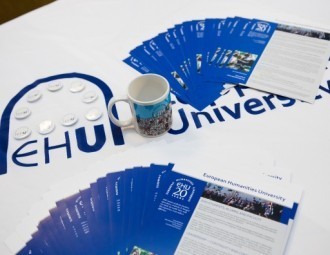EHU discussed its future

The students and alumni of the Belarus university in exile didn’t wait when the results of the rector election are announced, and organized a conference on the future of their alma mater.
Since the candidates for Rector of the only Belarusan University in exile presented their programmes to students, professors and the Governing Board no new information on the selection process has been disclosed. The final decision rests with the Selection Committee.
Not waiting for the sun to shine EHU students and alumni organised a two-day conference “The Belarusan EHU: 10 years in Lithuania” over the future of the only Belarusan University in exile. It took place on 9-10 January 2015 in Vilnius. The conference is to result in preparing a document with recommendations to the university management. A journalist of Belsat chose the highlights of the discussions.
Dzianis Kuchynsky, EHU Student Union:
‘I want this document to play a pivotal role when the Governing Board is arriving at the decision, I want them to listen to our voice once again.’
Only three of seven candidates who had been invited in advance appeared at the conference. They shared their positions on the further development of this unusual university. Politician Aliaksandr Milinkevich is eager to make Belarusanness a strategical goal of the university.
Aliaksandr Milinkevich, candidate for Rector:
‘The EHU may become a venue for a lot of people – for both who work here and do a wonderful job and for those in Belarus. [It should be] a venue where Belarus is a major focus of interest and research.’
Professor Tatsiana Schyttsova, editor of university journal Topos, has been working at the EHU for a long time. The university is losing its public image, she says.
Tatsiana Schyttsova, candidate for Rector:
‘How can one state that the EHU has achieved success when our financial situation is critical? At that, our administration costs are unreasonably high.’
The university SEOs failed to be present at the conference: EHU President Anatol Mikhailau, Vice Rectors Aliaksandr Kalbaska and Bernardas Gailius refused to take part in the event. While EHU community did have questions to David Pollick, EHU acting rector, he did not make time for the meeting. Only Vice Rector Darius Udrys attended the conference, but he participated as a candidate for Rector, not as a representative of the university management.
Darius Udrys, candidate for Rector:
‘We are not going to neglect faculty. We should look at which structures can be streamlined. I have a plan, that would streamline those expenses and reduce more than two thirds of the deficit that is developed as a result of decisions that were made over the past year.
The members of the Governing Board did not honour the conference with their presence either. This body consists of international experts with only one Belarusan among them. The university managers do lack the Belarusan look at the key issues, education experts suggest.
Uladzimir Kolas, Council of Belarusan Intellectuals:
‘We really appreciate Europe’s assistance but it should not be catch-all. Belarusans should take part in developing solutions and taking decisions when it comes to Belarus. Who else sees the matter better and knows what is to be done?’
The students also invited Pavel Tserashkovich and other lecturers who have recently been fired. A lot of students still cannot go with these dismissals.
The members of the General Assembly who were present at the meeting recognised that the procedure of electing Rector and the role of the Governing Board in it triggered many questions. But it is the General Assembly that is to take the final decision: they are expected to give the name of a new Rector by March, 1.
Let us recall that though founded in the Belarusan capital, Minsk, in 1992, soon after the dissolution of the Soviet Union, the European Humanities University was one of the few private, nonprofit liberal-arts institutions in the country.
But in 2004, Belarusan officials shut it down after it stood up against attempts to undermine its academic freedom. In response, a small team of faculty members and administrators set up a “university in exile” across the border in neighboring Lithuania.
-
03.01
-
07.10
-
22.09
-
17.08
-
12.08
-
30.09



























